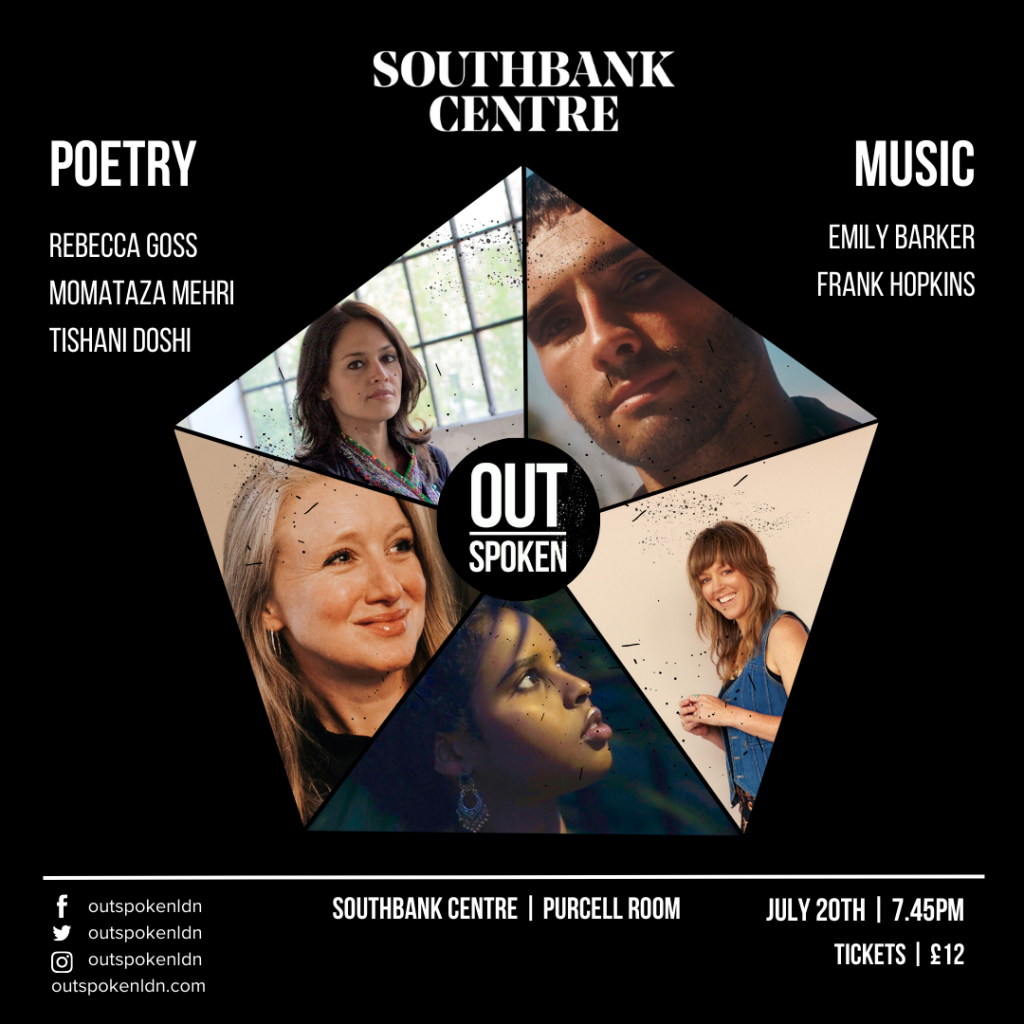
Tickets here: https://www.southbankcentre.co.uk/whats-on/literature-poetry/out-spoken-july
My fourth collection, Latch, is published this month. It’s been a long time coming. You can read how the book morphed to its final shape on the Carcanet blog and watch a short video of me taking a stroll in a favourite Suffolk wood to speak more about the collection. I am grateful to John McAuliffe, Andrew Latimer and the Carcanet team for producing such a beautiful looking book, and to my husband, for capturing a part of our home for the cover. That well-thumbed latch is ours.
The book is available to buy here and please join me for the online launch on June 7th, hosted by the brilliant Caroline Bird.
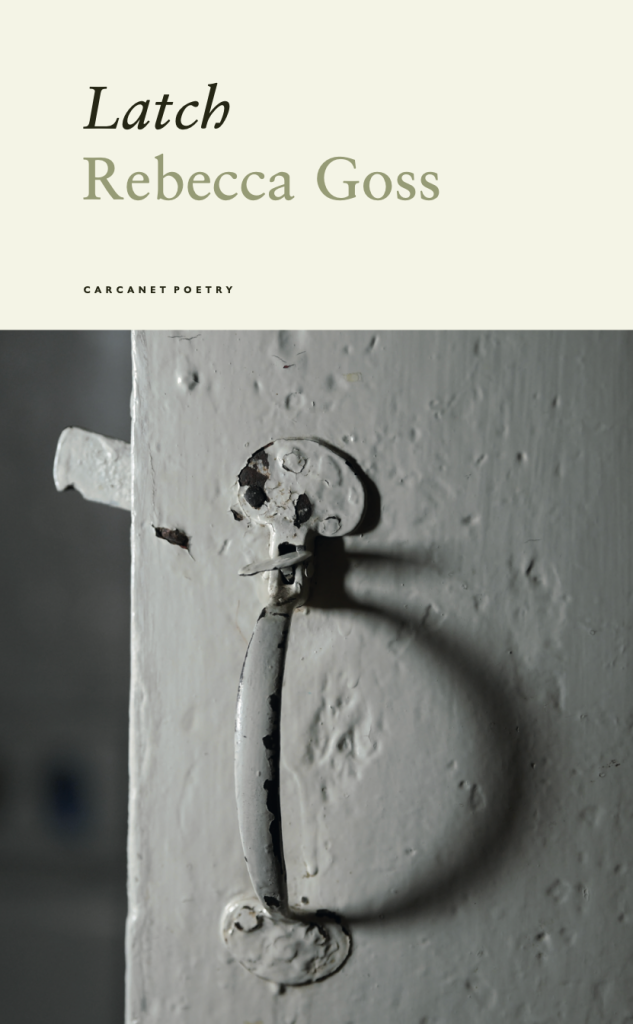
‘Rebecca Goss’ fourth and most ambitious collection, Latch, is a study in the act of returning. It is about reconnecting to a place, Suffolk, and understanding what it once held, and what it now holds for a woman and her family. These poems unearth the deep, lasting attachments people have with the East Anglian countryside, gathering voices of labour, love, and loss with compelling particularity. The book is various, unpredictable: memory and magic interweave, secrets tangle with myth. As in her earlier books, Goss again draws on her distinctive ability to plough difficult, emotional terrain. Here is an anatomy of marriage, her parents’ and her own, while the natural world becomes an arena for the emotional push and pull that exists between mothers and daughters. The return to a childhood home recalls young siblings retreating into nature as they steer the adult lives that disintegrate around them. Readers will find themselves beckoned to barns, fields, weirs, to experience both refuge and disturbance: we are shown a county’s stars, and why a poet needed to return to live under them.’
‘This collection collapses the boundaries between land and lineage, is filled with portent, vestige, longing. I don’t know how it’s possible for these poems to be so intimate, yet vast. They beat fiercely with bird-animal-human hearts.’
Tishani Doshi
‘Latch brings us an evocation of the past which avoids the pitfalls of sentimentality or nostalgia. Instead here is something sharp, joyful and interrogating: a bright, taut view of a rural English childhood. Her astute eye lets nothing through as the latch of memory and the blacksmith’s making become a vehicle for a poised engagement with the shifting roles of motherhood across time.’
Deryn Rees-Jones
Available: https://www.carcanet.co.uk/cgi-bin/indexer?product=2466
2022 began with an invitation from the British Library for drafts from Her Birth. They will feature in Poems in Progress, an anthology of poets’ drafts, which will be published in September this year. I have been sent an advance copy and it is beautiful. Each poet’s work presented in fascinating, forensic detail.
I did not find it easy revisiting poems written at a difficult time. I dug out the drafts, stacked them on my study floor, then walked around them for weeks. I was asked to provide a commentary to sit alongside the drafts and in the end my delayed start made for (I hope) a more interesting reflection.
The book contains very raw versions of my poem ‘Room in a Hospital’ and it does feel a little exposing to share work at such an early, private stage. But this book is the most amazing thing I’ve ever been included in, and I must confess, I had a little cry when I opened its pages.
Visit the British Library shop for an exclusive 10% discount on all preorders using the code BLPIP10 https://shop.bl.uk/products/poems-in-progress-drafts-from-master-poets
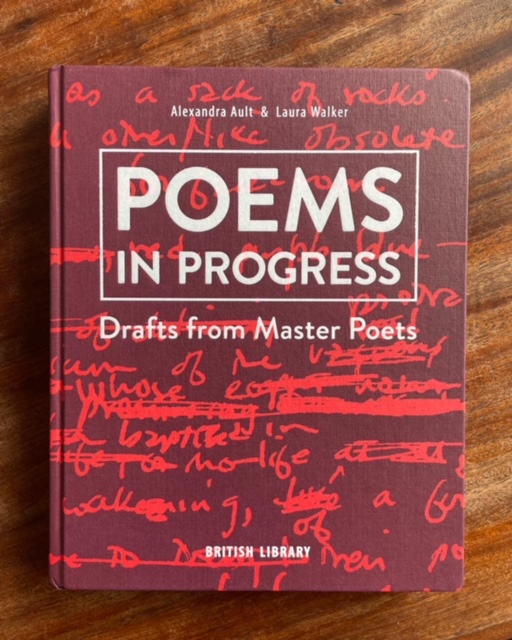
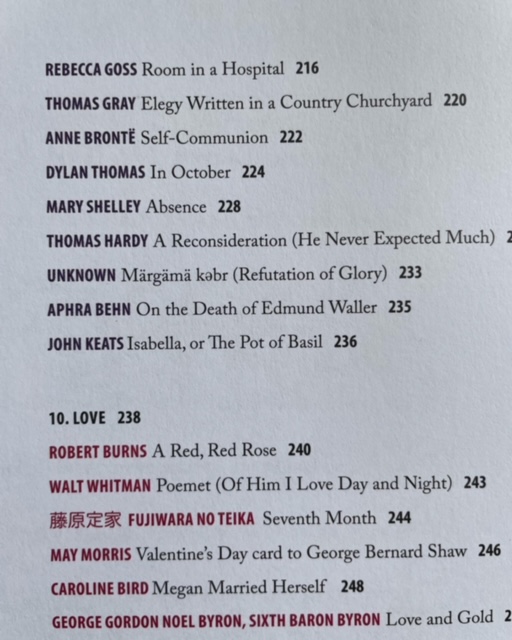
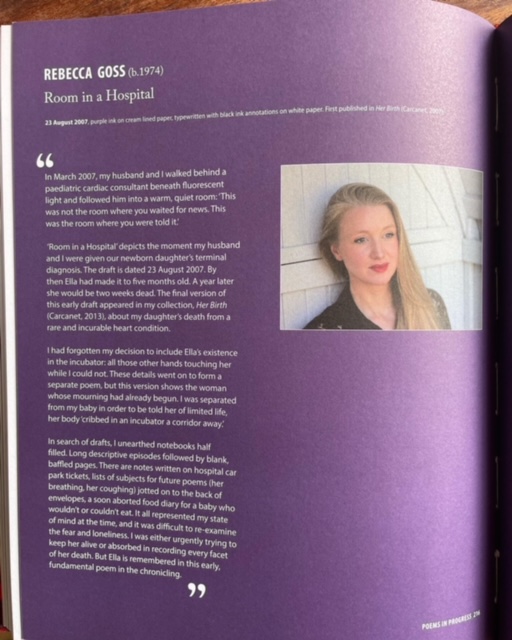
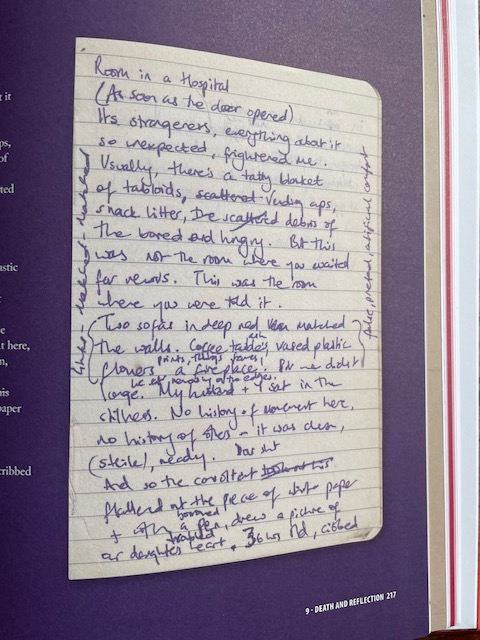
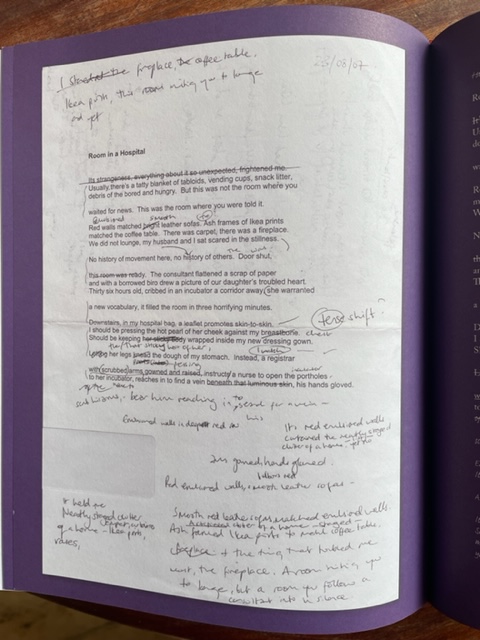
And here’s the final published version, found in Her Birth
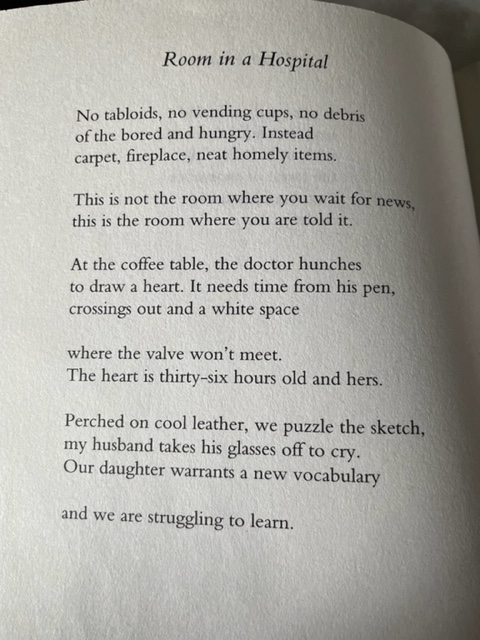
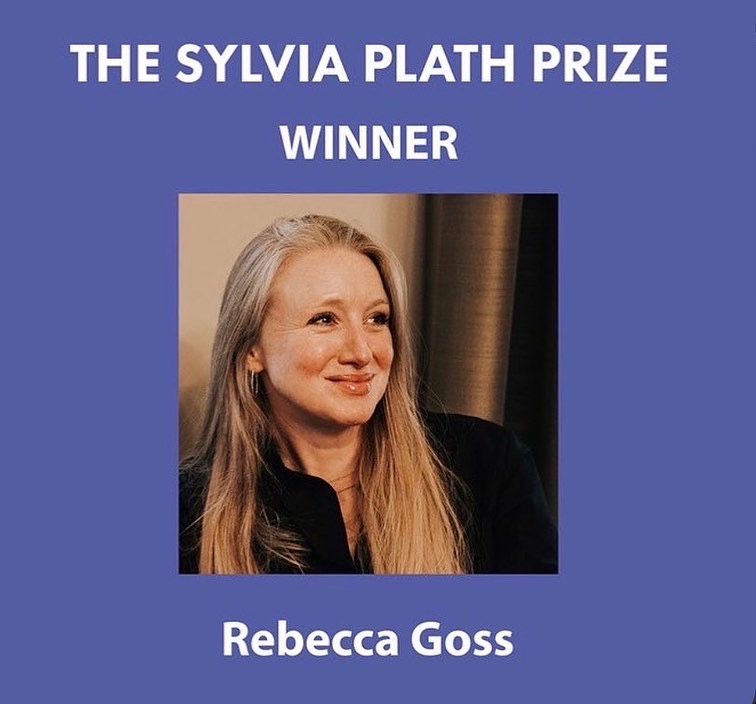
My thanks to Sarah Corbett and Ian Humphreys, competition judges and poets I admire who selected my poem ‘When It Feels Hot, That Rage Against Me’ for First Prize in the 2022 Sylvia Plath Prize. The winning poem will be published by Nine Arches Press this autumn in After Sylvia, a publication to celebrate the 90th anniversary of Sylvia Plath’s birth. Live events are planned to coincide with publication. Watch this space.
You can read my winning poem and find out more about the prize on the Sylvia Plath Prize website. The poem is taken from my next collection, Latch. The poems, set in Suffolk, explore the county’s landscape and specifically my connection to it. They have been a long time in the making. It feels good to have a poem from the manuscript acknowledged in this way. Further new poems from the book are coming soon in London Magazine, Magma, Poetry Birmingham Literary Journal and Poetry London. Three can also be read at Bad Lilies.
(Author photo by Natalie J Watts)
‘The scientist and the artist were once one -/how else could you record/what you saw? How else, find a way of seeing?’ – Rebecca Morgan Frank
It started with a Google search. The shameless kind. When you’re curious about your online existence, and there she was. Rebecca Goss. Scientist. By all accounts brilliant, and successful and quite rightly beating me to the top of any Goss listing.
An email arrived, a few years later. It’s an odd thing to see an email in your inbox, sent from yourself. Dr Rebecca Goss (scientist), Professor in Organic/Biomolecular Chemistry at the University of St Andrews, was getting in touch to say she too knew of our shared Google search and wondered if I would consider a collaboration of some sort. We arranged to meet online and quickly discovered we are of similar age, both mothers of daughters, both of us with connections to East Anglia. From that conversation we knew we would like to do ‘something’ combining science and poetry.
Today, on International Day of Women and Girls in Science 2022, I can share that Rebecca and I are now embarking on our project ‘NoMenClature’ – a collaborative project between poet and scientist resulting in the exploration of the culture of women in science. The aim is to highlight and celebrate chemists who are also mothers and to use poetry to disarm and address pervasive misperceptions about women in chemistry. Longer term, we hope to expand the project to include women working in other STEM disciplines. We are thrilled to have been awarded seed funding from the Wellcome Trust (Institutional Strategic Support Fund) and the Royal Society of Chemistry Inclusion and Diversity Fund. My poems will be profiling the lives of important women from the UK and abroad, exploring the paths their lives have taken and what it means to be a scientist, and to be a mother.
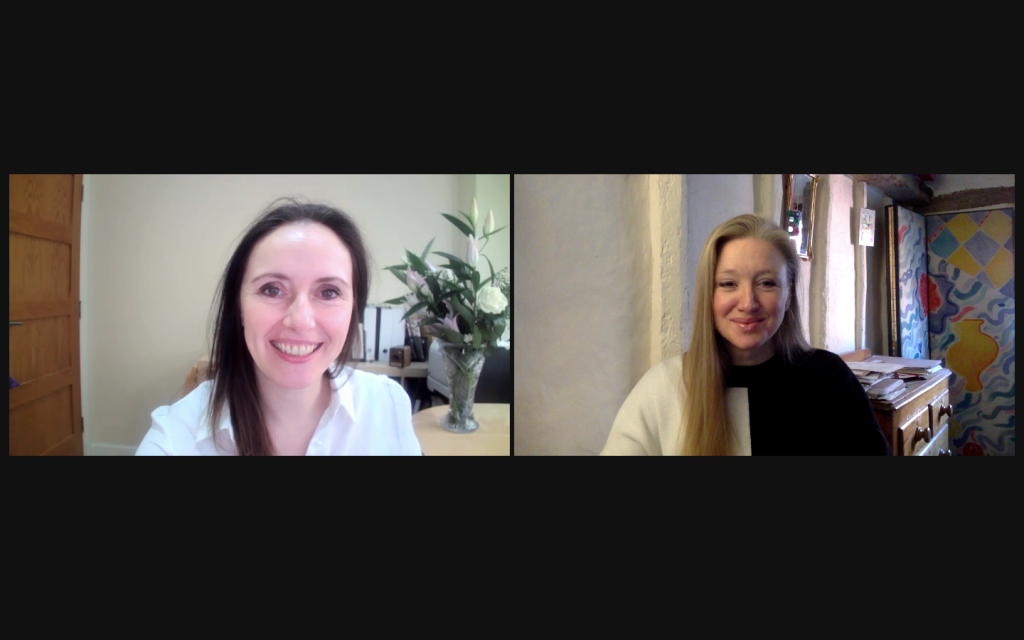
Dr Rebecca Goss’s research has been recognised through a series of national and international awards, and she has given over 120 invited research lectures globally. Discover more about all that she has achieved, and is achieving, here: https://risweb.st-andrews.ac.uk/portal/en/persons/rebecca-goss(67793718-7888-4ff5-9d92-5e4f0b6d3d41).html
After first speaking with Rebecca, I wrote ‘Nomenclature’, a poem that can be found in my most recent Carcanet collection Girl, first published in The White Review. It’s about the sharing of our name, a fact I mention casually these days, but I do think it brings something unique to what Rebecca and I do together now and in the future. Here’s the poem, and here’s to more…
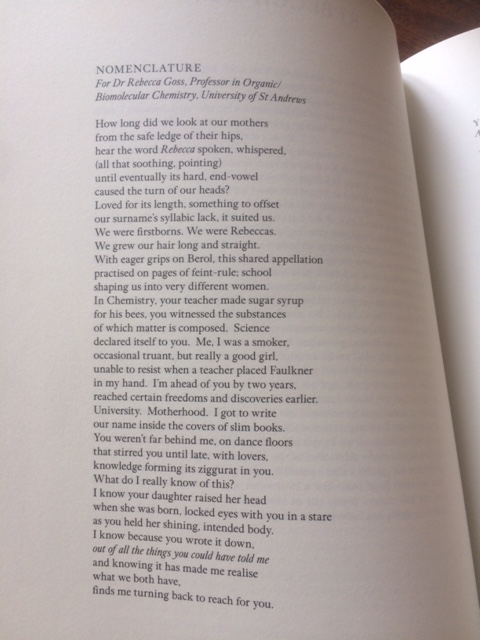
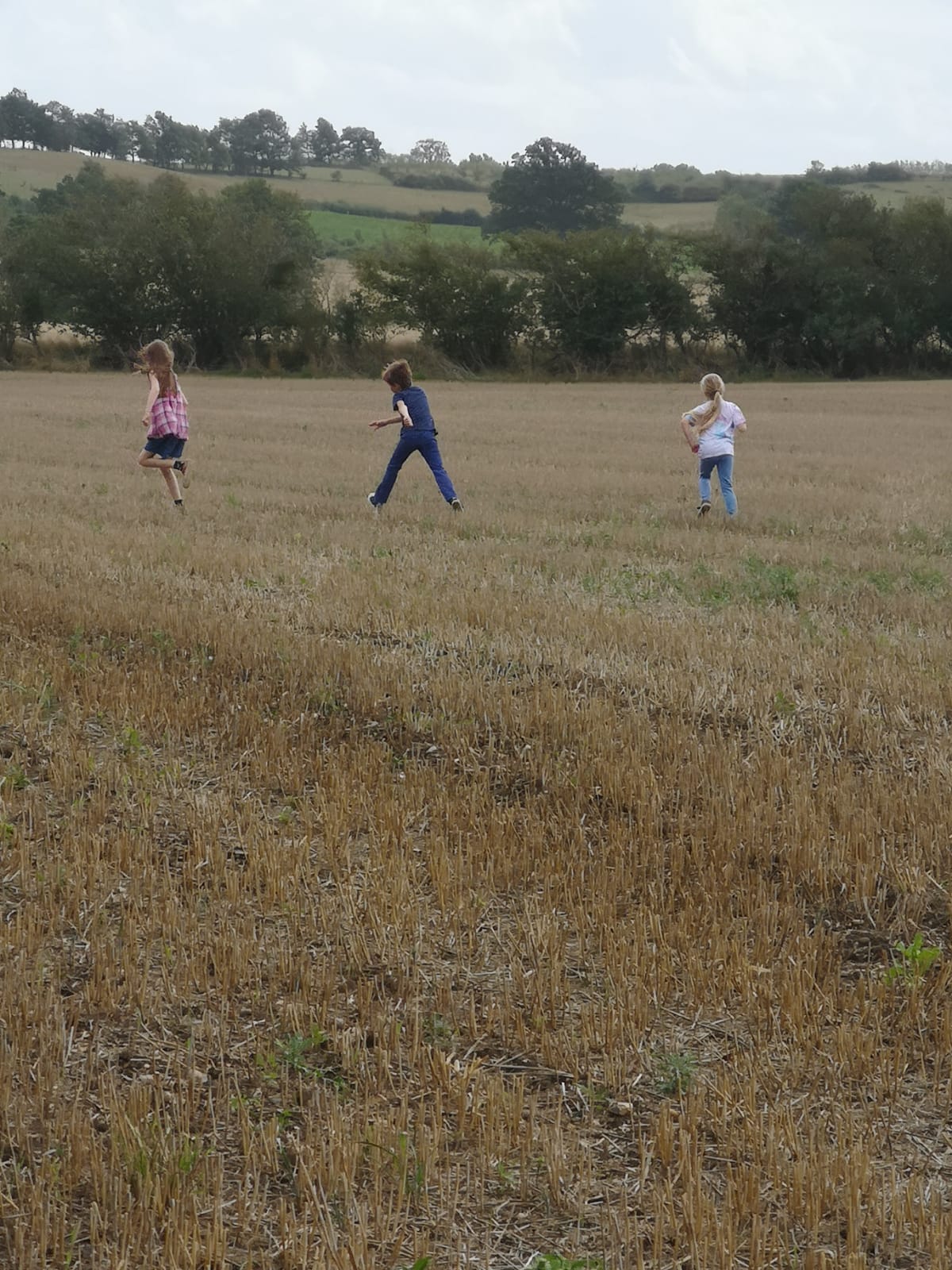
They were meant to know each other
in this piece of countryside.
They were meant to clamber its stiles,
show us the fields as they saw them.
They were meant to know seasons,
conduct fair-headed inspections
of bark, coevals at a river’s edge.
They were meant to know distance
and run ahead with the dog.
They were meant to know birdsong
and bracken and bees.
They were meant to know each other,
charting these lanes like we did.
They were meant to know rain
and slowworms, the berries
that bleed in a palm.
They were meant to climb
until my heart tipped,
come back down and argue
in the race to the ford.
They were meant to know rabbits
torn, opened,
and a muntjac’s stare
before the vanish into bramble.
They were meant to learn tracks
and to leave them,
and to know what it is to be lost.
They were meant to know each other,
and come to me with a clutch of cow parsley’s lace.
More new poems from my next collection can be read at Bad Lilies and London Magazine
This poem was written in April 2020, during lockdown 1, for my very good friend Sarah and published/animated for Carol Ann Duffy’s project WRITE Where we Are NOW. I never intended to write lockdown poems, but the things I like to write about: friendship, motherhood, domestic spaces were, and still are, very much at the fore during lockdown time. Another WWWAN poem, about my daughter growing UP in my small crooked house can be read here.
On November 28th I’ll be reading at the launch of the new Against the Grain anthology Arrival at Elsewhere. An ambitious, moving book-length poem composed by an array of contemporary voices, all responding to the pandemic, curated by Carl Griffin. The book is available now and in aid of NHS Charities Together. Launch details here.
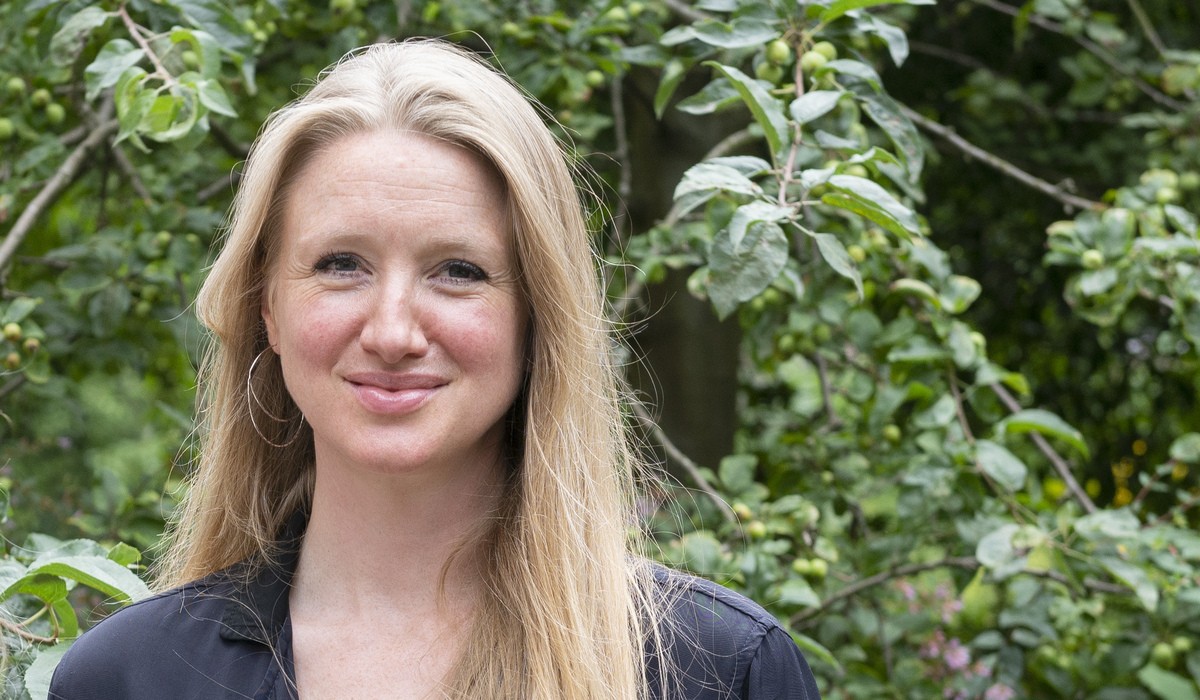
Rebecca Goss, a poet, tutor and mentor, returns to college to foster good writing practice
In October 2020, Rebeccca will take up the role of inaugural Royal Literary Fund Fellow at Lucy Cavendish and describes it as a ‘huge honour’. Rebecca has a longstanding relationship with the college – reading at the Women’s Word festival in 2010 and then taking part in the Connections: Science, Poetry and the Brain project in 2019.
Rebecca will be returning to the College, once again as a writer, but this time able to engage with students directly. As stated on the RLF website, the principal aim of the Fellow’s work is to foster good writing practice across disciplines and media. Rebecca says:
“I am thrilled to be coming to Lucy Cavendish, and have always felt so welcome. I will be there to assist students and staff from across the College with their writing skills. I feel this is exactly the right time in my career to be taking up this role. I am an experienced published poet with four books, but I also recently returned to university myself, as a mature student. I completed a PhD by Publication at UEA in 2019, and during my time there learnt a lot about academic writing. I feel I can share my experiences now, of being an undergraduate at 18, and also a mature student at 45!”
Rebecca’s main tasks will be to assist in the practice of good and clear academic writing. Students from across the university will be able to book a consultation with a sample of their work. Not being a subject specialist, Rebecca won’t be commenting on content, but she will be looking closely at style and technique and helping students to move their essays forward.
Rebecca continues:
“I would like to help relieve students of any writing anxiety they may be experiencing. I will not be their tutor but the dynamic will be a confidential and unique one. I hope students will make the most of my presence at Lucy Cavendish, to come and talk about their academic writing in a relaxed and comfortable space.”
See the video of my commissioned Connections poem ‘After Zika’ here https://www.lucy.cam.ac.uk/events/connections-science-poetry-and-brain
I’ll get to the strange and wonderful part in a minute, but firstly I wanted to briefly look back at 2019, which has felt pretty whirlwind so far.
January to March was spent completing my thesis, which I began at the University of East Anglia in 2018. The shorter timeframe of a PhD by Publication is intense, but I met the deadline, and could not have written my thesis without the help, guidance and support from my supervisors Rebecca Stott and Sophie Robinson. Both women were wise, frank and astute at every meeting and with so many things I wanted to say, they made sure I never lost my way. I passed my viva, with no corrections, in May. Poet Denise Riley and Professor Neil Vickers, Co-Director of the Centre for Humanities and Health at King’s College London were my examiners and to talk to them about Her Birth, grief and disclosure was illuminating. I spoke about my research for the first time publicly, at the Postgraduate Contemporary Women’s Writing Network conference in Hull at the start of September, and an extract from my thesis has just been published in the autumn edition of Poetry Review. I am still thinking about what to do with the thesis next, but for now I’m reassured by Rebecca Stott’s recent and accurate words to me, that the act of writing the PhD ‘did its immediate work.’ There were things I needed to explore closely, as a writer and as a bereaved mother, and I achieved that I think.
Three days before my viva, I launched my latest poetry collection Girl at the Parafin Gallery in London, where Girl’s cover artist Alison Watt, was exhibiting her work. I think most people know by now about my slight obsession with Alison’s work. (I wrote a piece about how her paintings have inspired me for the Carcanet blog several months ago). Despite feeling hugely anxious about the looming viva, the launch was a lovely night. A gathering of friends and family, with my bigger kids running the bar, John Clegg as LRB bookseller extraordinaire and my eight-year old Molly working the room, chatting to more people than I did. I am very grateful to Parafin for letting me use their gorgeous gallery space. To read my poems, surrounded by Alison’s paintings, meant a great deal.
Girl has had some nice reviews and has gone on to be Highly Commended in the Forward Prizes 2019, with the poem ‘Rachel’. The book has also been shortlisted for the 2019 East Anglian Book Awards alongside Lavinia Greenlaw’s The Built Moment and Helen Ivory’s The Anatomical Venus in the Poetry category. I’m honoured to stand beside them both. Carousel, my collaboration with photographer Chris Routledge, still feels like a new book, but is almost a year old now. There’s a lovely review at London Grip.
In July, I began the collaborative project Science, Poetry and the Brain, at Cambridge University’s Lucy Cavendish College. Eight poets have been paired with a scientist each, to discover more about their field of research and write a responding poem. The poems will be aired at an event with all the poets and scientists present, on October 26th, as part of Cambridge’s Festival of Ideas. ‘My’ scientist is the virologist Nicola Rose, and she wrote an excellent piece for the Lucy Cavendish College blog about the day we first met. You can read it here.
August began with a week long residency for Suffolk Libraries as an artist in residence at Hadleigh Library. It was part of the arts programme BLOC: Building Libraries on Creativity and involved five East Anglian artists being given the time to develop their own creative practice, as well as working together to share ideas and think about how libraries can become creative hubs. I was the only writer there that week, and loved being around visual artists for five days, watching them work. After that, the coast. For the Gosses, August is about birthdays and sad anniversaries, but this year we managed an overdue holiday, our first in four years. We didn’t go far, liking this county as we do, but just to be able to wake up and walk to the shore with dog, daughter and a crabbing bucket was enough.
My Suffolk Poems are (still) ticking over, and September has seen a new one published in the first issue of Bath Magg, an exciting online magazine from editors Joe Carrick-Varty and Mariah Whelan. The autumn continues with several readings coming up, including Manchester Literature Festival and Poetry in Aldeburgh. See my events page for more information. I’ve been mentoring some great poets this year. It’s wonderful to see their successes and I’m finding the role of mentor to be more and more rewarding. I’m still a regular at the Poetry Cafe, providing Poetry Surgeries to give feedback on poems in progress. Slots are available for my next session in a few weeks time. I’ll be back at Arvon too, tutoring ‘Discovering the Tools’ alongside Kei Miller in February 2020.
And the strange and wonderful part is that for the first time, in a very long time, I have felt happy. I mention it because I experienced it as a real physical sensation. No different from being aware of a headache, or an oncoming sneeze. Several months ago, I felt waves of genuine happiness rush through me, and I realised I had not felt anything like that for over a decade. There are lots of reasons why I think this is happening now, including feeling very settled here in Suffolk after our move from Liverpool, the people important to me are well and thriving, and I dealt with so much when writing the thesis. I have never believed in ‘moving on’, or ‘getting over’ grief, but I want to tell other bereaved people that one day, you might be out walking, maybe with a dog, the weather will be irrelevant, but you will feel happiness return to you. It may only be fleeting, but it will feel like the start of being restored.
In the mid-nineteen eighties, my Dad was asked to be best man at a friend’s wedding. For his speech, he chose to read the words to Van Morrison’s ‘In the Garden’. I have a vivid memory – not of the wedding, I didn’t go – but of listening to the album from which the song is taken, in my Dad’s car, as we drove around the Suffolk lanes of my childhood. On one journey, when I must have been about twelve, I was looking at the album’s cassette case, and unravelling the pleasingly detailed inlay that tapes came with then, the lyrics to each song printed out. My Dad asked me to find ‘In the Garden’ and read it to him. I did. He turned the volume down on the car stereo, so he could listen to me read every word. He was listening to a poem. And I look back on that car journey as an early poetry reading in my life. I was not raised in a religious home. My Dad would comfortably describe himself as an atheist, but I have never forgotten the words to that spiritual song and when I hear it, I feel connected to that summery breeze, the daylight, the nature, the the garden, and to him.
exploring the difference mentors make
Magazine - Writing School - Events
Writer
new poetry during the pandemic
A series of discussions, interviews and live recordings with poets in the UK and beyond, in which we examine the writing process. Now hosted by Peter deGraft-Johnson, LPP was founded in 2014 by David Turner.
Poems, thoughts...etc.
Jennie Farley's poetry, new book HEX and contact details
Author, Poet, Editor